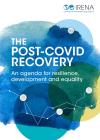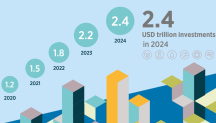

-
-
IRENA (2020), The post-COVID recovery: An agenda for resilience, development and equality, International Renewable Energy Agency, Abu Dhabi
Copied
/-/media/Files/IRENA/Agency/Publication/2020/Jun/IRENA_Post-COVID_Recovery_2020.pdf
Copied
Post-COVID recovery: An agenda for resilience, development and equality
Newsletter
Increased uptake of renewables, energy efficiency and related energy-transition measures represent far-sighted investment amid the crisis set off by the COVID-19 pandemic. As part of short-term stimulus and recovery plans, the energy transition provides a crucial link to medium- and long-term global climate and sustainability goals.
This report from the International Renewable Energy Agency (IRENA) offers practical advice on key investment and policy decisions for the crucial post-COVID recovery. It is rooted in the comprehensive long-term energy transformation strategy provided by IRENA’s first Global Renewables Outlook.
Among other findings:
- Post-COVID recovery measures could drive a lasting shift in the global energy mix.
- Linking the short-term recovery to medium and long-term strategies is paramount to achieving the Sustainable Development Goals (SDGs) and the Paris Agreement on Climate Change.
- National and regional energy transitions can help to build resilient economies and societies.
- Energy transition investment can boost GDP and create jobs in the 2021-23 recovery phase.
- Green investment will be vital to mobilise upfront finance for the transition.
- Each million dollars invested in renewables or energy flexibility would create at least 25 jobs, while each million invested in efficiency would create about 10 jobs.
- Compared to current plans, an accelerated energy transition could add 5.5 million more jobs by 2023.
- Employment in all regions of the world, even where fossil-fuel jobs are now concentrated.
- Immediate investment increases could put renewable power generation on track to grow five times faster.
- Renewables, although affected along with the rest of the economy, appear more resilient than other parts of the energy sector.
Key policy recommendations for the 2021-23 recovery phase include:
- Ambition: Raising national targets and enhancing climate pledges.
- Public intervention: Securing strategic finance, investing in transition-related infrastructure, steering investment away from fossil fuels, and making bailouts conditional on climate action.
- Power sector investment: Safeguarding existing renewable projects and ensuring stable policy frameworks for transition-related infrastructure.
- Heating and cooling investment: Scaling up transition-related technologies through quotas and mandates and creating the infrastructure for district systems and green hydrogen.
- Transport investment: Creating renewable-based, efficient infrastructure, incentivising electric vehicle and biofuel use, and promoting behavioural changes to reduce the impact of travel.
- Employment: Protecting existing jobs, supporting workforce expansion in transition-related fields, co-ordinating with industries and developing education and training to minimise skills gaps.
- Industry: Diversifying supply chains, developing local industries, providing finance and promoting supplier development programmes and industry clusters.
- Access: Maintaining energy access initiatives, ensuring reliable power supply and supporting distributed renewable energy solutions to strengthen health, sanitation and other critical infrastructure.
Beyond renewables and decarbonisation, investments in the energy system in the wake of the COVID-19 pandemic can pave the way for equitable, inclusive and resilient economies.




